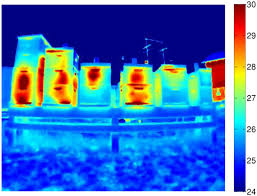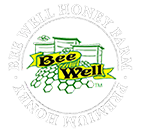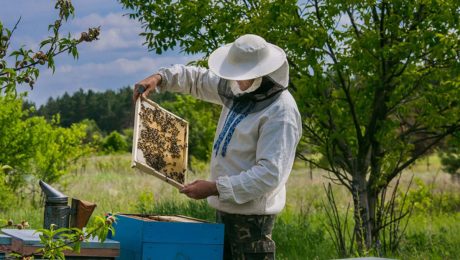Honeybee colony inspections are a very important part of being a good beekeeper. The beekeeper has to decide when to intervene and when to leave the bees to their own plans.
Honeybee colonies do not require a lot of management on a regular basis but there will be times of the year when you need to do perform important maintenance. Right now is one of those times.
The bulk of the honey flow is over in our area and most beekeepers have harvested the excess. Now is the time to make sure the bees have lots of stores left and to plan for any mite treatments. Healthy bees in September will produce healthy bees in October for the important over wintering population.
Check out our Beekeeping Tips for September for more information about what we recommend you do in this month.
Beekeeper’s Supplies and Education – Important Parts of a fascinating hobby
One of the most important facets of becoming a beekeeper is the beekeeper’s supplies and education. These elements are considered long before the bees ever arrive. At least this is the optimum way to become involved in beekeeping. Americans have enjoyed the hobby of beekeeping ever since the colonists first arrived – some bringing colonies of honeybees with them in the 1600’s.
Today the hobby of beekeeping is seeing a resurgence in popularity brought on by the media coverage of large honeybee losses. Keeping honeybees has changed a lot in the last 30 years. It is the intelligent approach to beekeeping that is most likely to yield good results. Many catalogs contain pages and pages of Beekeeper Supplies that can be overwhelming. Proper Beekeeper education can help the new hobbyist prepare for and mange their colonies.
Bee Well Honey has provided a full line of beekeeping supplies for years. We have everything you need to get started from beginners books to wooden ware and even the bees themselves. After a very successful event in the Fall of 2014, we will be offering a one day Beekeeping Bootcamp in the Spring of 2015. This one day class will feature lecture time and field time in actual hives. Date and price to be determined.Are you ready to dive into beekeeping ?
Order your bees NOW for spring delivery. Order bees here
Want more information about the Beekeeper Boot Camp ? Email us at : beewellhoney@bellsouth.net
The coolness of Fall is a delight to all beekeepers who have been suffering from humidity and sweat all during the long Carolina summer. Our beesuits that were resplendent, crisp and white in early Spring are now sweaty, smokey and possibly covered with dirt, wax, propolis and bee poop. (Unless of course you have laundered your suit periodically – as you should).
Hopefully you have checked your colonies to insure they have sufficient winter stores before the cold weather is here to stay. In Upstate SC, we have now experienced a killing frost- very little or no fresh nectar will be available for foraging. You may also be running out of time to feed them sugar water as they can not access it well during the cold. We encourage our customers to check the honey stores of their colonies in September-October to give the bees their best chance of survival.
In our local area, it is not necessary to wrap beehives for the winter. In fact, most beekeepers leave the screen bottom boards open and only reduce the entrance to help the bees protect the hive as bee numbers dwindle over winter. You may start out will a large cluster in late Fall but the number of bees alive in January/February will be less as bees start to die before new ones are produced. A healthy cluster with plenty of food stores in the correct location should be able to maintain survival temperatures. The bees must consume food to generate heat. We are often impressed by beekeepers in colder regions who require extensive insulation to help their bees. One of our customers photographed this Alaskan beehive that was fully wrapped in straw against the winter cold. Luckily, this is not necessary here and you may even do more harm by trapping excess moisture inside the hive.
Honeybees practice homeostasis and maintain a nearly constant temperature during the winter but only inside the cluster itself. With the warmest temps in the middle of the cluster – it becomes cooler on the outside wall of bees and the temps inside the hive itself may get quite cold. Bees don’t need or require a heated space. Thermal imaging shows where the clusters are located in the boxes by the colors shown in the image.
So make sure your bees are ready for winter with good stores and we will hope for an early spring. 
Even though we are still in the grips of a hot southern summer – next Spring will arrive before we know it. This is a great time to pre-order honeybees for delivery next March-April. Buying honeybees is an important step for new beekeepers or those wanting to expand their bee yard.
Many people do not realize that the earliest honeybee delivery dates always sell out. Those beekeepers who order early are best assured of prime pickup dates.
Bee Well is taking orders NOW for Spring Delivery of Honeybee Packages
Pickup Dates will be made available when the orders are finalized in early January.
3# Italian Pkg with mated Queen $95 cash $97 credit card
Call to reserve your packages today !
864-898-5122
Each year Bee Well Honey enjoys being part of the South Carolina Beekeepers Association meeting in Clemson SC during late July. This meeting of beekeepers from all across the state offers a time of learning, shopping and socializing for many of the states 3,000 small scale beekeepers. Bee Well Honey sets up a booth for the event each year.
Yes, we sell honey but we also offer much much more !
Gifts, beeswax candles, pottery and other special items were on display and are available in our store every day.
We really enjoyed the conference this year and meeting so many of our regular customers as well as making new friends. Bee Well Honey has been helping beekeepers for over 1o years and hopes to continue for many more.
Nucleus Colonies (also known as nucs) are a valuable tool for the backyard beekeeper. Nucleus colonies contain 5 large brood frames instead of the 10 that is normal for a basic hive. These nuc colonies will house the queen and enough bees to maintain a small family and carry on regular hive operations. They do require more management than a regular size hive because they can outgrow their space quickly. Once the main honey flow is over and we still have plenty of summer (warm) weather, you still have time to set up a few nucleus colonies. There are many ways to make nucs (or splits). One of our favorites is to remove 3 frames of bees (capped brood) from a overcrowded colony. (Be sure to get some with capped brood, honey and pollen) Then add one frame of very fresh eggs ( 1 day old), this will allow the bees to make a new queen for the nuc. Be sure to put a lot of bees in the small colony to ward off a small hive beetle invasion. Feed the nuc until they are well established and the new queen has bees hatching – longer if needed to finished comb construction and storage of honey. Bee Well Honey has nuc woodenware ready to assemble for $ 43.95 plus tax.
Honey Extraction is one of the best times of the beekeeper year. Having the proper equipment can make the job much more enjoyable. Honey Extractors come in many sizes and configurations from the humble 4 frame to the monster sizes powered by electric motors. We offer several types of honey extractors at Bee Well Honey for the beginner or seasoned beekeeper. This featured Economy 6 frame extractor is hand crank and only $ 415 plus tax. Investing in quality beekeeping supplies are a great long term investment.










